UPDATE: October 1st, 2018 - California Strikes Back
As expected, despite being dead at the federal level, the fight for network neutrality has continued at the state level - and last night California signed strong new state level network neutrality rules into law - prohibiting carriers from blocking or throttling lawful internet traffic, charging fees to allow some sites to have priority over others, and banning paid data-cap exemptions.
And of course - the federal government objects.
Attorney General Sessions immediately filed a lawsuit against California to block the law, saying:
"The California legislature has enacted an extreme and illegal state law attempting to frustrate federal policy. The Justice Department should not have to spend valuable time and resources to file this suit today, but we have a duty to defend the prerogatives of the federal government and protect our Constitutional order. We will do so with vigor."
The courts will now need to decide where the FCC's authority ends and the state's begins - and the case will likely be tied up in the courts for a while, leaving the fate of network neutrality rules in limbo.
Meanwhile - several other states are moving to pass similar state level laws, and a lawsuit filed by 22 states and joined by several tech companies and organizations is proceeding to force the FCC to roll back the network neutrality rule repeal.
This long messy fight is far from over.
For context - our original article continues below:

Despite some last minute congressional wrangling to slam on the brakes, FCC Chairman Ajit Pai's "Restoring Internet Freedom Order" proposed in December (read our in-depth coverage at the time) went into effect on Monday.
This brings an official end to the FCC's Network Neutrality rules, which were rolled out in 2015.
But what does this mean, and what is actually changing?
What are the potential impacts coming for mobile users?
And - is the fight over this contentions issue really over this time?
Table of Contents
First, A Recap On Network Neutrality
The core "bright line" Network Neutrality rules that applied to both mobile and fixed broadband were as follows:
- No Blocking: broadband providers may not block access to legal content, applications, services, or non-harmful devices.
- No Throttling: broadband providers may not impair or degrade lawful Internet traffic on the basis of content, applications, services, or non-harmful devices.
- No Paid Prioritization: broadband providers may not favor some lawful Internet traffic over other lawful traffic in exchange for consideration – in other words, no “fast lanes.” This rule also bans ISPs from prioritizing content and services of their affiliates.
In other words - internet providers needed to be "neutral", and treat all traffic on their networks the same.
I explained the case for each side in our 2015 post when the rules were first passed:
- The Case In Favor of Neutrality: The Internet is built on openness and a long tradition of network neutrality, and services like Netflix or YouTube or even Google might never have been possible if the network providers were acting as gatekeepers. Letting internet providers block or throttle certain services in favor of ones which have paid for exclusive access to customers, or a special "fast lane", will destroy the internet as we know it, eliminating the level playing field that has made the Internet such an engine for innovation. Without the protection of network neutrality, new companies and services will never be able to reach critical mass, and only the biggest companies will be able to afford to pay for access.
- The Case Against Neutrality: The government has no business interfering with the business agreements that internet providers enter into, and doing so violates the first amendment rights of the carriers. The worries of what might happen without regulation are overblown - the FCC stepping in to enforce net neutrality is the start of a slippery slope that will lead to the government sucking all the innovation and profit out of the telecommunications industry. Investment in faster network speeds and increased coverage will dry up. And eventually... this will all just inevitably lead to more taxes, and even more regulation.
In general, most internet and tech companies (large and small) have been in favor of strong network neutrality rules, saying that they are just codifying into law long established existing practices.
And most cable TV and telecom companies have been strongly against the regulations, saying that FCC oversight is not needed. Many claim that they can be trusted to abide by the principals of network neutrality without needing regulations in place to force the issue.
Overall, there are very legitimate arguments to be made for both sides.
Do You Trust The Carriers, or the Government?
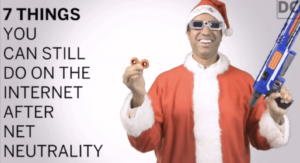
The carriers have been fighting hard to get out from under the network neutrality rules, but now that they are free from most FCC oversight and regulation - will there actually be any changes in behavior?
Probably nothing drastic - at least at first.
The carriers are actually bending over backwards right now to make pledges that they will abide by the spirit of the network neutrality rules, even without a legal requirement to do so.
For example, Verizon promises:
"We will not accept payments from any company to deliver its traffic faster or sooner than other traffic on our consumer broadband service, nor will we deliver our affiliates’ internet traffic faster or sooner than third parties’. We will not prioritize traffic in a way that harms competition or consumers."
But Verizon also promises on the same page to "not throttle or slow down any internet traffic based on its source or content", while they are actually already doing so on the Verizon Wireless network by throttling video stream speeds to limit video resolution unless customers pay for higher tiers of service or "Premium Streaming".
And AT&T has pledged:
"AT&T does not favor certain websites or internet applications by blocking or throttling lawful internet traffic on the basis of content, application, service, user, or use of nonharmful devices on its broadband internet access services."
Yet despite this - AT&T is moving to more closely bundle DirecTV and AT&T services, and now that AT&T is cleared to acquire Time Warner (home of HBO, CNN, TNT, WB, and so much more) the pressure to bundle and favor its own properties will only increase.
And without a any legal oversight around playing favorites, things are bound to get muddy over time.
What Impacts Are Possible?

Here are some of the specific potential changes possible under the new rules that we see as potentially impacting mobile users:
- Network Management / Throttling Changes - Before the neutrality rules, carriers like AT&T throttled "unlimited" plans that crossed a certain threshold, slowing them down for the remainder of the month regardless of network load. Under pressure from the FCC, policies shifted to the current style of network management - where slowdowns only occur temporarily and only when towers are actively congested. With the neutrality rules scrapped, carriers may feel empowered to go back to the old style of throttling.
For example: With hard throttles back in place, customers would have a lot more incentive to pay for Verizon's new 75GB "Above Unlimited" plan instead of the 22GB "Beyond Unlimited" plan. - Video Services Favoritism - Before the neutrality rules, AT&T and Verizon were making moves to strongly favor their own video services - allowing for unlimited free streaming access only for DirecTV or Go90 customers. The prior FCC administration ruled this was a violation of the neutrality rules, and the carriers backed away from this as they embraced unlimited data plans. But with the rules going away, carriers may seek to get back to offering limited data plans that allow unlimited streaming only for their own partner services. This might be great if you are a DirecTV fan, but it also might strongly encourage customers to pick TV service and internet service as a package going forward.
- Toll Free Data - Before the neutrality rules, carriers had been making moves to allow for websites and services to be "toll-free", letting them sponsor the data used to view them. This might allow for cheaper cell services, but it also removes some of the incentive for carriers to lower the per-GB cost of data. The more data costs, the more likely customers are to seek out toll-free sites - making sponsorship more valuable for the sponsoring sites in the process. This scheme makes no sense in a truly unlimited data world, but if carriers start to slip back to enforcing high-speed data limits these programs will likely be back soon after.
- Pro Service Tiers / VPN-Blocks - One of the ways that carriers intend to make more money is by tracking your usage and then selling targeted ads. Verizon in particular has been clear that it intends to rival Google when it comes to tracking and targeted advertising. Using a VPN destroys carriers tracking ability, but under the neutrality rules carriers would have a hard time blocking customers using a VPN for this. But now, it would not be surprising to see carriers move to someday only allowing "Business Class" plans to have unlimited VPN access, and regular plans may be limited to only a certain VPN usage amount per month.
Are all these changes likely?
Certainly not - particularly not right away.
But things are changing.
And there will certainly be some impacts - both negative ones (like potential new limits) and positive ones (like potentially cheaper service offerings) over time as carriers stretch their wings and explore their new options.
Is The Fight Really Over?
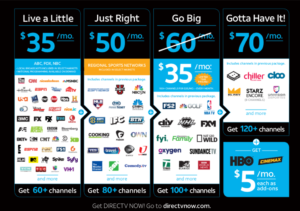
At the federal level, yes. For now.
But half the states are pushing for various state level Network Neutrality rules, and they are gearing up to fight the legality of the FCC's rule that actually blocks states from being able to do so.
Things are messy - and will likely remain so for a while.
Meanwhile - carriers are likely to (hopefully) remain on their best behavior, trying to demonstrate that they can be trusted and do not need regulation.
Where this all ends up in the end remains anyones guess, but we'll be tracking it closely.
Further Reading:
This is indeed a very complicated issue. Here are a few good articles on the subject, if you'd like to know more:
- FCC Abandons Network Neutrality Rules - What Does It Mean? (our December 2017 story)
- Understanding “Network Neutrality” – Implications For Mobile Internet (our 2015 featured article)
- Federal Register: Protecting and Promoting the Open Internet (the full original ruling & dissent)
- 2016 RV Mobile Internet Year in Review & Looking Forward Into 2017 (we predicted these changes coming long ago...)
- FCC Finds Verizon and AT&T Violate Net Neutrality Rules, T-Mobile in the Clear (January 2017 ruling - the final act of the former FCC chairman)
- FCC Takes Action to Restore Internet Freedom (the 2017 reversal of the 2015 rules)
- Dissenting FCC Commissioner Statements (two of the five FCC commissioners voted against the rule rollback)
- Stratechery: PRO-NEUTRALITY, ANTI-TITLE II (a well reasoned argument in favor of the rule rollback)
- The Oatmeal Explains Net Neutrality in a Comic (biassed, but funny)
- C-Net's Network Neutrality FAQ (very comprehensive)
NOTE: Comments that are focused on the politics of this issue are not appropriate here, and will be deleted. We are eager to hear your thoughts on how the changes are likely to impact mobile internet users however.
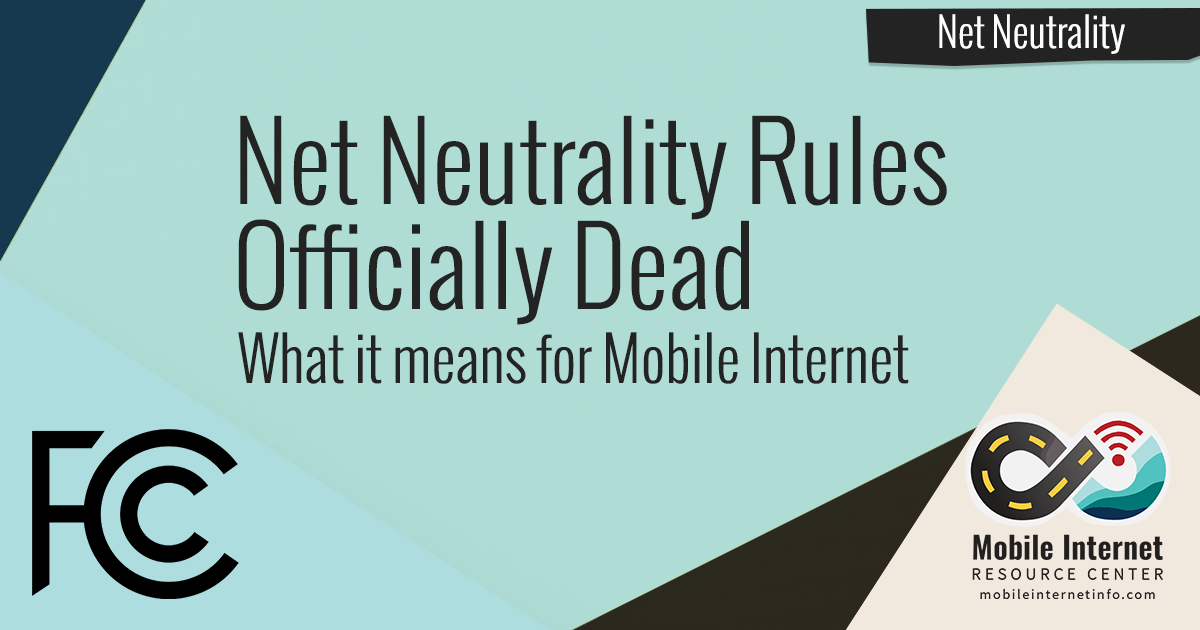
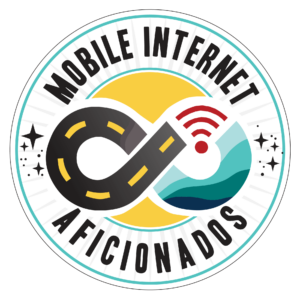


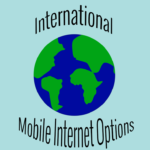

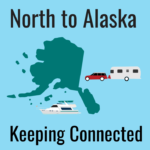
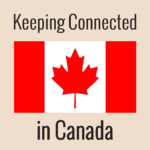
 Mobile Internet Resource Center (dba Two Steps Beyond LLC) is founded by Chris & Cherie of
Mobile Internet Resource Center (dba Two Steps Beyond LLC) is founded by Chris & Cherie of